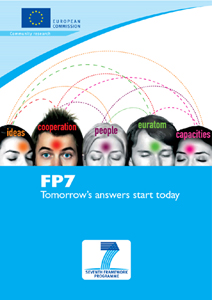News Story
KMi secure Euro funding for Open University research
Thursday 29 Jan 2009
In collaboration with key European education and commercial partners, The Open Universitys Knowledge Media Institute (KMi) will be leading the way in an additional five EU funded consortia to develop a variety of information technology initiatives over the next four years, all ultimately designed to increase computing, business and education efficiency.
Already well represented and highly respected in the European Framework for Research, these latest grant awards totaling some 2.8m, place KMi firmly in the vanguard of IT research in Europe. Open University Pro Vice-Chancellor for Research and Enterprise, Professor Brigid Heywood says the grants given to KMi are an indication of the global respect garnered by KMi and the Open University.
The Open University is amongst the best universities in the UK in the area of research in computing, as evidenced by the excellent performance of our Centre for Research in Computing in the latest RAE Professor Heywood said. KMi is a world leader in the research and development of cognitive and learning sciences, artificial intelligence, semantic technologies, and multimedia.
KMi researchers will be led by key academics in the design and delivery of key outputs
Dr Peter Scotts team are coordinating STELLAR, an EU funded Network of Excellence. STELLAR will aim to build capacity in international Technology Enhanced Learning (TEL) research by de-fragmenting the market offers of the current stakeholders and creating communities of best practice.
Leading and directing the science in STELLAR, Dr Scott will be identifying ways to build upon, synergize and extend the valuable work already started in the previous TEL consortia in which KMi had significant presence.
Additionally, Dr Scotts team will participate in ROLE, an Integrated Project aiming to develop a research platform that is designed to make the needs of the learner central to education. ROLE will help companies and education institutions personalise learning in a mass, structured way, with personalisation not done at the design level of learning services, but on the user’s side – with the learner.
Professor Enrico Motta and his team will contribute to SmartProducts. The project will develop the scientific and technological basis for the embedding of proactive knowledge into smart products that are able to communicate and co-operate with humans, other products and the environment. Proactive knowledge encompasses knowledge about the product itself (features, functions, dependencies, usage, etc.), its embedding (physical & virtual environment), its users, and the specific use context.
Dr. Zdenek Zdrahal and his team will participate in Tech-IT-Easy. This project represents the first of a new funding model from the EU, supporting SMEs directly with funding to research specific industry questions. Tech-IT-Easy aims to develop an IT tool, targeted to support SMEs operating in the Electro-mechanical Industrial Sector, that will create a systematic approach to support the generation and management of the overall innovation process.
Professor John Domingues new project is NoTube, a project whose ultimate goal is to put the TV viewer back in the driving seat by developing a flexible/adaptive end-to-end architecture, based on semantic technologies, for personalised creation, distribution and consumption of TV and Internet content, understanding the needs of the telewebber and their concurrent interaction with broadcast and internet technologies.
Dr Peter Scott, Director of KMi, is proud of the labs record in securing research funding from the European Framework as well as UK research Councils. KMi has built a reputation based on delivery of exceptional research outputs in some key fields for the future of Internet computing. Our new crop of research projects builds on this excellence and will deliver significant results in these key fields
Related Links:
Latest News
PhD Awarded for Groundbreaking Research on Game-Based Cyber Security Training
KMi at the Palace of Westminster: Exploring Blockchain for Society and Economy
OUAnalyse at the Digital Ethics Summit 2025: Advancing Responsible AI in Education

